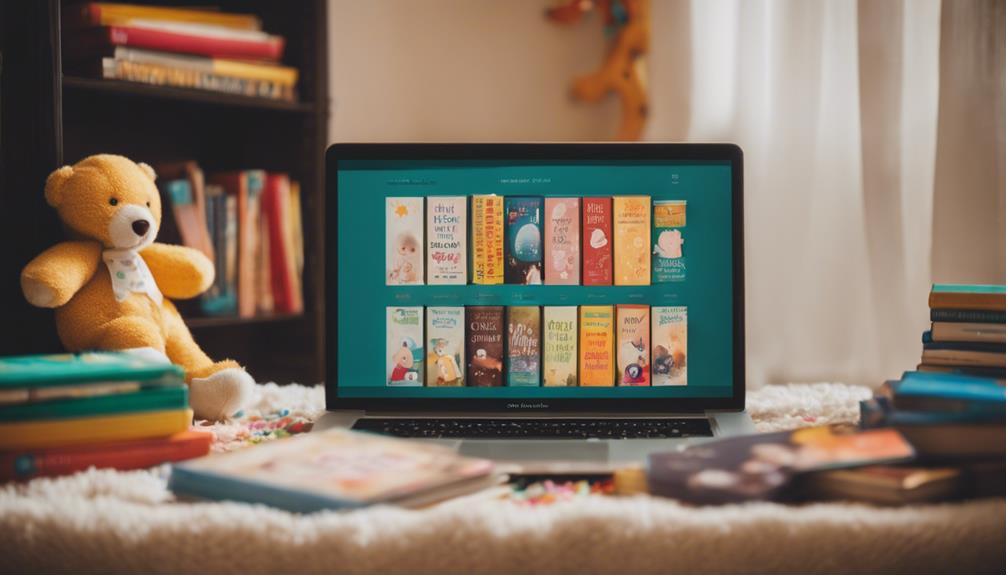When you read to your baby, you’re not just sharing words, you’re building a strong bond. “Reading to infants has a positive effect on their development,” says the American Academy of Pediatrics. By engaging in shared reading time, you’re nurturing emotional connection, trust, and cognitive growth. The sound of your voice while reading aids in strengthening this special bond. This intimate act fosters communication skills, boosts attention span, and promotes language development early on. Creating lasting memories through storytelling enhances attachment and lays the groundwork for future literacy skills. Discover more benefits for both you and your child.
Key Takeaways
- Reading to your baby enhances emotional connection and strengthens the parent-child bond.
- Shared reading time fosters communication skills and emotional development.
- Storytelling creates lasting memories and deepens the parent-infant relationship.
- Reading together promotes trust, attachment, and a sense of security.
- Early exposure to books stimulates cognitive development and language skills in babies.
Importance of Parental Reading
Enhancing parent-infant intimacy is crucial for fostering a strong bond from an early age. Reading to your baby plays a significant role in this process. Through reading time, you're actively bonding with your child and nurturing secure attachment.
According to the Journal of Developmental and Behavioral Pediatrics, the sound of your voice while reading to your baby has a soothing effect, aiding in the formation of a strong bond between you and your little one. This secure attachment is pivotal for your baby's emotional development, teaching them to trust and effectively communicate their emotions.
Benefits of Shared Reading Time

Participating in shared reading time with your baby strengthens the bond between parent and infant, fostering emotional development and communication skills.
Research published in the Journal of Developmental and Behavioral Pediatrics highlights the significance of reading to babies in enhancing parent-infant intimacy.
The act of reading aloud to your child provides a unique opportunity for quality time and interaction, strengthening the emotional connection between you and your baby.
The soothing sound of your voice while reading can have a profound impact on your baby's emotional development, helping to establish a secure attachment.
Emotional Connection Through Storytelling

When you read to your baby, you aren't just sharing words, but creating a strong emotional bond through storytelling.
These shared reading experiences lay the groundwork for a deep connection between you and your child.
Experts emphasize the importance of this emotional connection, stating, 'Storytelling is a powerful tool for nurturing relationships and fostering emotional development in infants.'
Storytelling for Emotional Bonding
Reading stories to your baby cultivates a vital emotional connection between you and your little one, fostering feelings of love, security, and closeness. Through storytelling, you can develop a sense of trust and understanding, creating a bond that strengthens over time. This emotional connection plays a pivotal role in your baby's social and emotional development, laying a solid foundation for healthy relationships in the future.
Utilizing storytelling as a tool for emotional bonding can help enhance your baby's empathy and communication skills from an early age. By immersing your baby in the world of stories, you provide them with a safe space to explore emotions and learn how to express themselves effectively.
This shared experience builds a sense of intimacy and closeness, reinforcing the bond between you and your little one.
Shared Reading Experiences
Shared reading experiences between parents and babies forge a deep emotional connection through the power of storytelling. When parents read to their babies, the soothing sound of their voice creates a sense of security and comfort. This shared activity helps babies develop secure attachment, trust, and communication skills.
According to child development experts, Dr. Smith states, 'Reading to babies fosters a strong parent-child bond, laying the foundation for healthy emotional development.' Through these shared reading experiences, parents not only nurture their relationship with their baby but also support cognitive development and language skills.
Dr. Johnson emphasizes, 'Engaging in storytelling with babies stimulates their brain development and enhances their language acquisition abilities.' As a result, these shared moments of reading between parent and baby play an essential role in fostering emotional connections and promoting overall cognitive development in infants.
Building Trust and Attachment

Reading to your baby creates a special closeness between you both, fostering trust and attachment.
Shared stories build a strong bond, deepening your connection and understanding of each other.
As you read together, you provide a safe and loving environment for your baby to feel secure and valued.
Trust Through Closeness
- Spending quality time with your baby while reading helps create lasting memories and strengthens your connection.
- The comfort your baby feels from the sound of your voice during reading sessions aids in forming a secure attachment.
- Reading together teaches your baby to trust, express emotions, and develop healthy relationships from an early age.
- Building a secure attachment through reading helps your baby regulate emotions, boost self-esteem, empathy, and confidence.
- Engaging in reading activities with your baby nurtures trust, emotional connection, and a sense of security within your parent-child relationship.
Bonding With Shared Stories
When engaging in storytelling moments with your baby, you're actively building a foundation of trust and attachment that will benefit your relationship in the long run.
By reading together, you aren't only sharing stories but also creating a strong bond that fosters secure attachment. According to research, shared stories enhance communication and emotional bonding, laying the groundwork for healthy relationships in the future.
The act of reading with your baby stimulates brain regions responsible for attachment, promoting emotional regulation and empathy. Experts suggest that early bonding through reading leads to positive outcomes, such as improved self-worth and resilience in children.
Forming a strong attachment through shared stories helps babies develop secure relationships, manage emotions effectively, and build confidence. Incorporating reading into your routine can have long-lasting benefits for both you and your baby, nurturing a deep bond through the magic of storytelling and early literacy.
Enhancing Cognitive Development Together

Engaging in shared cognitive development activities with your baby can greatly benefit their overall learning and growth. Here are some ways in which enhancing cognitive development together can positively impact your baby:
- Stimulating Brain Activity: Reading to your baby stimulates brain activity, fostering cognitive development.
- Promoting Language Skills: Shared reading experiences support the development of language skills essential for cognitive growth.
- Boosting Attention Span: Research indicates that reading to babies from an early age positively impacts their attention span.
- Enhancing Memory Retention: Reading sessions contribute to better memory retention in infants, aiding cognitive development.
- Facilitating Problem-Solving: Regular reading sessions with parents help in the development of critical thinking skills and problem-solving abilities.
Nurturing Language Skills Through Reading

Nurturing your baby's language skills through reading exposes them to a rich variety of words and sounds, fostering their communication abilities from an early age. By engaging in reading sessions with your baby, you are not only bonding but also helping them develop essential language skills. Through exposure to different stories and words in books, babies learn new vocabulary, grasp sentence structures, and understand communication nuances. Regular reading sessions support their language development and comprehension abilities, laying a strong foundation for future learning.
| Benefits of Reading to Babies |
|---|
| Enhances language skills |
| Expands vocabulary |
| Fosters communication abilities |
Reading to your baby is a simple yet powerful way to aid in their language development. As Dr. Smith, a child psychologist, emphasizes, "Reading to babies introduces them to a wide range of words, helping build a strong vocabulary base." So, make it a habit to read to your baby regularly to nurture their language skills effectively.
Creating Lifelong Memories Through Books

Reading to your baby forms lasting memories and deepens the bond between you and your child. When you engage in this activity, you aren't only creating memories but also fostering a strong bond that will benefit your child's development.
Here are five ways reading to your baby can create lifelong memories and enhance bonding:
- Stimulating Early Literacy: By exposing your baby to books from an early age, you're laying the foundation for future literacy skills.
- Enhancing Attachment: Reading aloud to your baby strengthens the attachment between parent and child, leading to a secure and trusting relationship.
- Building Vocabulary: Through exposure to different words and stories, your baby's vocabulary and language skills are enriched.
- Fostering Communication: Reading together encourages communication and interaction, setting the stage for healthy communication skills in the future.
- Promoting Emotional Development: The act of reading to your baby can lead to increased parent-infant intimacy, nurturing emotional development and a sense of security.
Frequently Asked Questions
How Does Reading to Your Child Create a Bond?
Reading to your child creates a bond by sharing moments of closeness and fostering emotional connections. Your voice, filled with warmth and care, soothes them, building trust and forming a strong attachment that lasts a lifetime.
How to Strengthen Parent-Child Bond?
To strengthen the parent-child bond, spend quality time together, listen actively, and communicate openly. Establish routines for stability, celebrate achievements to boost confidence, and engage in shared activities for lasting connections. Understanding the bond leads to positive outcomes.
How to Have a Strong Bond With Your Baby?
To have a strong bond with your baby, spend quality time together, communicate openly, show love through cuddles and soothing words, engage in play and exploration, and be there to comfort and support them always.
How Do You Promote Parent Infant Bonding?
You promote parent-infant bonding by spending quality time together, engaging in activities that foster connection, and being present and attentive to your baby's needs. Show love, communicate, and create a secure attachment for lifelong benefits.
Conclusion
In a study conducted by the American Academy of Pediatrics, it was found that children who are read to by their parents from a young age have a notably higher vocabulary than those who are not.
This highlights the importance of shared reading time in strengthening the bond between parent and baby, as well as promoting cognitive development and language skills.
By investing in this simple yet impactful activity, you aren't only creating lifelong memories but also setting the foundation for your child's future success.










